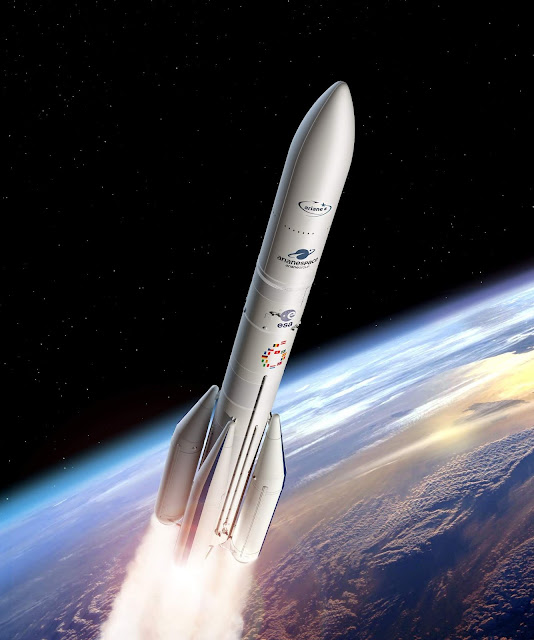ESA - European Space Agency patch.
May 30, 2020
Development of Europe’s first ever lunar lander was agreed upon by ESA Member States in 2019 and now ESA is seeking your ideas for science and robotic missions on the Moon.
Destination Moon
Set to launch on an Ariane 64 rocket later this decade and return to the Moon on a regular basis, the large lander will provide unprecedented opportunities for science and robotics on the lunar surface and your mission could be one of the first.
Artist's view of the configuration of Ariane 6 using four boosters (A64)
The call for ideas comes hot on the heels of ESA signing an agreement to start building the third European Service Module for NASA’s Artemis programme. This module will drive the spacecraft that ferries the next astronauts to the Moon.
Repeat trips to the Moon
The European-led large lunar lander programme provides autonomous access to the Moon, delivering 1.5 tonnes of material from Europe's Spaceport in Kourou, French Guiana – this is roughly the weight of a hippopotamus.
European Large Logistic Lander approaching Moon
The programme, currently known as the European Large Logistics Lander or EL3 for short, is designed to incorporate different types of uncrewed missions, from supply runs for Artemis astronauts, to stand-alone robotic science and technology demonstration missions and even a lunar return mission to bring samples to laboratories on Earth.
Destination: Moon
“This European lander will be able to access locations all over the Moon from the equator to the poles, from the near side to the far side, opening up tremendous opportunities to deliver science, research technology and infrastructure,” says ESA’s Exploration science and research coordinator James Carpenter, “developing this capability is a hugely important strategic step for Europe. It will allow us to take a lead in future robotic missions and support international activities at the Moon’s surface.”
The best of all worlds
Now that ESA has defined the hardware, launch and operations side for this unique European programme, the agency is looking for outstanding mission ideas that could be delivered by the European Large Logistics Lander.
Examples of what could be proposed include robotic exploration of lunar caves, telescopes on the far side of the Moon, searching for water ice or producing useable products from resources on the Moon.
Moon
“We are asking the best minds to submit ideas for this programme as we explore our Solar System in collaboration with scientists, engineers, industry, and companies,” James continues, “we really want to extend this call for ideas outside the realm of the usual space players, considering all aspects of lunar exploration.”
The lunar lander programme is not a one-shot mission but promises regular launches starting in the later part of this decade and continuing into the 2030s.
European Large Logistic Lander unloading cargo
We are looking for ideas that align with ESA’s strategy for exploration to inspire, create new knowledge, grow international cooperation and create economic growth and industrial competitiveness.
Human spaceflight and robotic exploration future
Any company, organisation or person can submit their ideas for the EL3 programme. Details and information on how to apply are available here. The deadline for submissions is 3 July 2020:
https://ideas.esa.int/servlet/hype/IMT?documentTableId=45087607022749715&userAction=Browse&templateName=&documentId=7257e8d165a32b877027ebfc5e67d8d9
Related article:
Third European Service Module for mission to land astronauts on the Moon
https://orbiterchspacenews.blogspot.com/2020/05/third-european-service-module-for.html
Related links:
Human and Robotic Exploration: http://www.esa.int/Science_Exploration/Human_and_Robotic_Exploration
Science & Exploration: http://www.esa.int/Science_Exploration
Images, Videos, Text, Credits: European Space Agency (ESA)/D. Ducros/L. Parmitano/T. Pesquet/ATG-Medialab.
Best regards, Orbiter.ch






